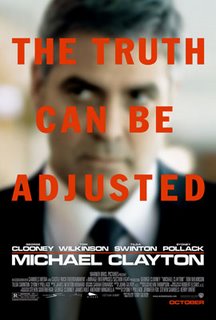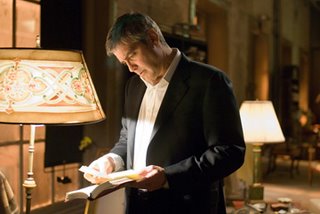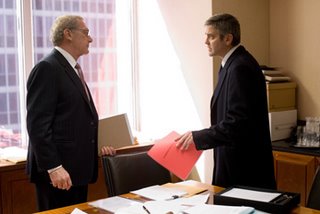
There are a lot of times when I think that the art of the slow burn thriller is dead. These are the thrillers that slowly sneak up on you, rather than throw everything they've got at you all at once. Instead of relying on shocks and twist endings, they rely on characters and dialogue. It's tricky to pull off, and if done wrong, your film can come across as tedious and wordy. Just when I think the art is dead, along comes a movie like
Michael Clayton to renew my faith. An intelligent adult drama that deserves many screenings just to figure out the intricacies of the characters and the plot, this is a movie that truly takes you by surprise. Just when you think it's not going anywhere, and the characters are just spouting off legal jargon, it hits you emotionally in a way that only the best films can.

The title character is portrayed by George Clooney, in what is perhaps the best performance of his career so far. Michael Clayton works for a law firm as a "fixer". His job is to clean up after other people's mistakes and to cover up any dirty dealings going on outside the courtroom. Having done this job for 17 years, Michael is an expert at it, but he obviously wants out. He tried his hand at a risky venture running a bar, but it fell flat. He also has an ex-wife, a son, and a lot of gambling debts to deal with. Michael's latest job makes him question his life even more. An attorney and close friend named Arthur Edens (Tom Wilkinson) has supposedly gone off the deep end after years of dealing with a case where he was defending a chemical corporation called U/North. Arthur stumbled upon some classified information where the company is tied to the poisoning and deaths of many people, and found himself questioning his own moral standing, eventually leading to a psychological breakdown. As Michael is hired to step in and try to cover things up for both the head of the law firm (Sydney Pollack) and one of the heads of U/North (Tilda Swinton), he finds himself faced with his own conscience as the truth behind what Arthur has uncovered slowly reveals itself. The deeper Michael digs into the situation, he finds himself thrown into a situation more dangerous than he could have imagined.

Taking the director's chair for the first time, acclaimed screenwriter Tony Gilroy (
The Jason Bourne Trilogy) has crafted a movie where the patient and observant viewer prevails. This is the kind of movie where little things that seem unimportant at first play larger roles as the story goes on.
Michael Clayton is told somewhat out of sequence, opening with a series of events set late in the story, then flashing back to four days earlier, where we get to learn where the character arrived to the point we see him at during the first few minutes. This method may throw some audience members off, as it drops us directly into the middle of the story with no explanation for the first 10 minutes or so, but as the film unfolds, everything starts to make sense as long as the viewer is paying attention. The viewer must also be patient as well as attentive. This is a slow-paced, but not lethargic, film where the story details are slowly revealed little by little. There were some moments where I admit I started to think the film had lost its way. The middle section of the story deals a little too much with characters talking about legal matters, and throwing technical terms into the dialogue back and forth to each other. However, the movie never completely slows down, and always manages to at least hold onto our attention. We think the movie is spinning its wheels and going nowhere, but it is simply biding its time, and waiting for the right moment to ensnare us in its plot. It's a tricky thing to pull off, and
Michael Clayton does it beautifully.

Another thing it does beautifully is the handling of its characters, who all exist in a very "gray" area, and are neither entirely good or evil. This is something that has brought down many lesser films, but once again, Gilroy's screenplay and direction avoid all of the traps like a seasoned pro. These people are not defined by whether or not they fall under a certain category, but by the choices they make. Michael is a man who is obviously good at his job, but at the same time, we can see what it has done to him over the years. He has had to cover up some pretty terrible things in the past, and has most likely had to help out some people who he probably wouldn't want to run into anywhere else except outside a law office in the past. He is at constant war with his own ethics, and doing what is best for the company he works for, and for his own pocketbook. Everyone is faced with a similar dilemma throughout the film, and it is what has led Arthur to his current mental state. He can no longer look the other way when it comes to the dirty dealings of the company he is supposed to be defending, and no longer knows how to live with himself. Everyone faces this moral crossroad in a different way, and is what fuels the drama at the center of the film. It does so in a realistic way that does not play up the melodrama, or allow the actors to come across as too overwrought or tortured. They all come across as people who have done this all of their lives. Some continue to turn their face away from the truth, and some are at the breaking point. And then there are some who see the truth, but are good at hiding the fact that they do.

Given his usual smart, hip attitude that has made George Clooney a star in films such as the
Ocean franchise, it's sometimes easy to forget that he is a real talent. He gets to display a certain vulnerability and humanity here that we rarely get to see in his films, and he is wonderful almost from the moment he walks onto the screen. Michael Clayton is a complex character, and Clooney matches it every step of the way with an equally complex performance that plays like a smart man who is on the verge of a breakdown. In an equally tricky role is veteran actor Tom Wilkinson as Arthur, a man who may be crazy, or maybe he's just liberating himself from the years of being forced to look the other way. He is sympathetic instead of broad in his portrayal, and the final scene he gets to share with Clooney has a touching honesty to it. In smaller, but no less important roles, both Sydney Pollack and Tilda Swinton are stand outs in both sides of the companies involved with the case. What's even more amazing besides the fact that these performances never take a wrong step is that the movie never takes a wrong step in the handling of the characters. There is no false moment, or scene where they act out of character. They have all earned the outcome that their individual paths have led them when the story has ended.
 Michael Clayton
Michael Clayton is not likely a movie that will be embraced by mass audiences. Much like last year's
The Fountain, it is an intelligent and challenging picture that hides behind some big name talent and big studio gloss. Those who are patient enough to unravel its complexities will be rewarded, as this is a movie that actually gets better as you think back on it. It's not the kind of movie you watch over and over again for fun, and it's not the kind of movie you show to a group of friends, unless you all want to have a discussion afterward. This is the kind of movie where you sit quietly in the theater, and let the characters and the story slowly overwhelm you.
0 comments
 There are a lot of times when I think that the art of the slow burn thriller is dead. These are the thrillers that slowly sneak up on you, rather than throw everything they've got at you all at once. Instead of relying on shocks and twist endings, they rely on characters and dialogue. It's tricky to pull off, and if done wrong, your film can come across as tedious and wordy. Just when I think the art is dead, along comes a movie like Michael Clayton to renew my faith. An intelligent adult drama that deserves many screenings just to figure out the intricacies of the characters and the plot, this is a movie that truly takes you by surprise. Just when you think it's not going anywhere, and the characters are just spouting off legal jargon, it hits you emotionally in a way that only the best films can.
There are a lot of times when I think that the art of the slow burn thriller is dead. These are the thrillers that slowly sneak up on you, rather than throw everything they've got at you all at once. Instead of relying on shocks and twist endings, they rely on characters and dialogue. It's tricky to pull off, and if done wrong, your film can come across as tedious and wordy. Just when I think the art is dead, along comes a movie like Michael Clayton to renew my faith. An intelligent adult drama that deserves many screenings just to figure out the intricacies of the characters and the plot, this is a movie that truly takes you by surprise. Just when you think it's not going anywhere, and the characters are just spouting off legal jargon, it hits you emotionally in a way that only the best films can. The title character is portrayed by George Clooney, in what is perhaps the best performance of his career so far. Michael Clayton works for a law firm as a "fixer". His job is to clean up after other people's mistakes and to cover up any dirty dealings going on outside the courtroom. Having done this job for 17 years, Michael is an expert at it, but he obviously wants out. He tried his hand at a risky venture running a bar, but it fell flat. He also has an ex-wife, a son, and a lot of gambling debts to deal with. Michael's latest job makes him question his life even more. An attorney and close friend named Arthur Edens (Tom Wilkinson) has supposedly gone off the deep end after years of dealing with a case where he was defending a chemical corporation called U/North. Arthur stumbled upon some classified information where the company is tied to the poisoning and deaths of many people, and found himself questioning his own moral standing, eventually leading to a psychological breakdown. As Michael is hired to step in and try to cover things up for both the head of the law firm (Sydney Pollack) and one of the heads of U/North (Tilda Swinton), he finds himself faced with his own conscience as the truth behind what Arthur has uncovered slowly reveals itself. The deeper Michael digs into the situation, he finds himself thrown into a situation more dangerous than he could have imagined.
The title character is portrayed by George Clooney, in what is perhaps the best performance of his career so far. Michael Clayton works for a law firm as a "fixer". His job is to clean up after other people's mistakes and to cover up any dirty dealings going on outside the courtroom. Having done this job for 17 years, Michael is an expert at it, but he obviously wants out. He tried his hand at a risky venture running a bar, but it fell flat. He also has an ex-wife, a son, and a lot of gambling debts to deal with. Michael's latest job makes him question his life even more. An attorney and close friend named Arthur Edens (Tom Wilkinson) has supposedly gone off the deep end after years of dealing with a case where he was defending a chemical corporation called U/North. Arthur stumbled upon some classified information where the company is tied to the poisoning and deaths of many people, and found himself questioning his own moral standing, eventually leading to a psychological breakdown. As Michael is hired to step in and try to cover things up for both the head of the law firm (Sydney Pollack) and one of the heads of U/North (Tilda Swinton), he finds himself faced with his own conscience as the truth behind what Arthur has uncovered slowly reveals itself. The deeper Michael digs into the situation, he finds himself thrown into a situation more dangerous than he could have imagined. Taking the director's chair for the first time, acclaimed screenwriter Tony Gilroy (The Jason Bourne Trilogy) has crafted a movie where the patient and observant viewer prevails. This is the kind of movie where little things that seem unimportant at first play larger roles as the story goes on. Michael Clayton is told somewhat out of sequence, opening with a series of events set late in the story, then flashing back to four days earlier, where we get to learn where the character arrived to the point we see him at during the first few minutes. This method may throw some audience members off, as it drops us directly into the middle of the story with no explanation for the first 10 minutes or so, but as the film unfolds, everything starts to make sense as long as the viewer is paying attention. The viewer must also be patient as well as attentive. This is a slow-paced, but not lethargic, film where the story details are slowly revealed little by little. There were some moments where I admit I started to think the film had lost its way. The middle section of the story deals a little too much with characters talking about legal matters, and throwing technical terms into the dialogue back and forth to each other. However, the movie never completely slows down, and always manages to at least hold onto our attention. We think the movie is spinning its wheels and going nowhere, but it is simply biding its time, and waiting for the right moment to ensnare us in its plot. It's a tricky thing to pull off, and Michael Clayton does it beautifully.
Taking the director's chair for the first time, acclaimed screenwriter Tony Gilroy (The Jason Bourne Trilogy) has crafted a movie where the patient and observant viewer prevails. This is the kind of movie where little things that seem unimportant at first play larger roles as the story goes on. Michael Clayton is told somewhat out of sequence, opening with a series of events set late in the story, then flashing back to four days earlier, where we get to learn where the character arrived to the point we see him at during the first few minutes. This method may throw some audience members off, as it drops us directly into the middle of the story with no explanation for the first 10 minutes or so, but as the film unfolds, everything starts to make sense as long as the viewer is paying attention. The viewer must also be patient as well as attentive. This is a slow-paced, but not lethargic, film where the story details are slowly revealed little by little. There were some moments where I admit I started to think the film had lost its way. The middle section of the story deals a little too much with characters talking about legal matters, and throwing technical terms into the dialogue back and forth to each other. However, the movie never completely slows down, and always manages to at least hold onto our attention. We think the movie is spinning its wheels and going nowhere, but it is simply biding its time, and waiting for the right moment to ensnare us in its plot. It's a tricky thing to pull off, and Michael Clayton does it beautifully. Another thing it does beautifully is the handling of its characters, who all exist in a very "gray" area, and are neither entirely good or evil. This is something that has brought down many lesser films, but once again, Gilroy's screenplay and direction avoid all of the traps like a seasoned pro. These people are not defined by whether or not they fall under a certain category, but by the choices they make. Michael is a man who is obviously good at his job, but at the same time, we can see what it has done to him over the years. He has had to cover up some pretty terrible things in the past, and has most likely had to help out some people who he probably wouldn't want to run into anywhere else except outside a law office in the past. He is at constant war with his own ethics, and doing what is best for the company he works for, and for his own pocketbook. Everyone is faced with a similar dilemma throughout the film, and it is what has led Arthur to his current mental state. He can no longer look the other way when it comes to the dirty dealings of the company he is supposed to be defending, and no longer knows how to live with himself. Everyone faces this moral crossroad in a different way, and is what fuels the drama at the center of the film. It does so in a realistic way that does not play up the melodrama, or allow the actors to come across as too overwrought or tortured. They all come across as people who have done this all of their lives. Some continue to turn their face away from the truth, and some are at the breaking point. And then there are some who see the truth, but are good at hiding the fact that they do.
Another thing it does beautifully is the handling of its characters, who all exist in a very "gray" area, and are neither entirely good or evil. This is something that has brought down many lesser films, but once again, Gilroy's screenplay and direction avoid all of the traps like a seasoned pro. These people are not defined by whether or not they fall under a certain category, but by the choices they make. Michael is a man who is obviously good at his job, but at the same time, we can see what it has done to him over the years. He has had to cover up some pretty terrible things in the past, and has most likely had to help out some people who he probably wouldn't want to run into anywhere else except outside a law office in the past. He is at constant war with his own ethics, and doing what is best for the company he works for, and for his own pocketbook. Everyone is faced with a similar dilemma throughout the film, and it is what has led Arthur to his current mental state. He can no longer look the other way when it comes to the dirty dealings of the company he is supposed to be defending, and no longer knows how to live with himself. Everyone faces this moral crossroad in a different way, and is what fuels the drama at the center of the film. It does so in a realistic way that does not play up the melodrama, or allow the actors to come across as too overwrought or tortured. They all come across as people who have done this all of their lives. Some continue to turn their face away from the truth, and some are at the breaking point. And then there are some who see the truth, but are good at hiding the fact that they do. Given his usual smart, hip attitude that has made George Clooney a star in films such as the Ocean franchise, it's sometimes easy to forget that he is a real talent. He gets to display a certain vulnerability and humanity here that we rarely get to see in his films, and he is wonderful almost from the moment he walks onto the screen. Michael Clayton is a complex character, and Clooney matches it every step of the way with an equally complex performance that plays like a smart man who is on the verge of a breakdown. In an equally tricky role is veteran actor Tom Wilkinson as Arthur, a man who may be crazy, or maybe he's just liberating himself from the years of being forced to look the other way. He is sympathetic instead of broad in his portrayal, and the final scene he gets to share with Clooney has a touching honesty to it. In smaller, but no less important roles, both Sydney Pollack and Tilda Swinton are stand outs in both sides of the companies involved with the case. What's even more amazing besides the fact that these performances never take a wrong step is that the movie never takes a wrong step in the handling of the characters. There is no false moment, or scene where they act out of character. They have all earned the outcome that their individual paths have led them when the story has ended.
Given his usual smart, hip attitude that has made George Clooney a star in films such as the Ocean franchise, it's sometimes easy to forget that he is a real talent. He gets to display a certain vulnerability and humanity here that we rarely get to see in his films, and he is wonderful almost from the moment he walks onto the screen. Michael Clayton is a complex character, and Clooney matches it every step of the way with an equally complex performance that plays like a smart man who is on the verge of a breakdown. In an equally tricky role is veteran actor Tom Wilkinson as Arthur, a man who may be crazy, or maybe he's just liberating himself from the years of being forced to look the other way. He is sympathetic instead of broad in his portrayal, and the final scene he gets to share with Clooney has a touching honesty to it. In smaller, but no less important roles, both Sydney Pollack and Tilda Swinton are stand outs in both sides of the companies involved with the case. What's even more amazing besides the fact that these performances never take a wrong step is that the movie never takes a wrong step in the handling of the characters. There is no false moment, or scene where they act out of character. They have all earned the outcome that their individual paths have led them when the story has ended. Michael Clayton is not likely a movie that will be embraced by mass audiences. Much like last year's The Fountain, it is an intelligent and challenging picture that hides behind some big name talent and big studio gloss. Those who are patient enough to unravel its complexities will be rewarded, as this is a movie that actually gets better as you think back on it. It's not the kind of movie you watch over and over again for fun, and it's not the kind of movie you show to a group of friends, unless you all want to have a discussion afterward. This is the kind of movie where you sit quietly in the theater, and let the characters and the story slowly overwhelm you.
Michael Clayton is not likely a movie that will be embraced by mass audiences. Much like last year's The Fountain, it is an intelligent and challenging picture that hides behind some big name talent and big studio gloss. Those who are patient enough to unravel its complexities will be rewarded, as this is a movie that actually gets better as you think back on it. It's not the kind of movie you watch over and over again for fun, and it's not the kind of movie you show to a group of friends, unless you all want to have a discussion afterward. This is the kind of movie where you sit quietly in the theater, and let the characters and the story slowly overwhelm you.






0 Comments:
Post a Comment
<< Home